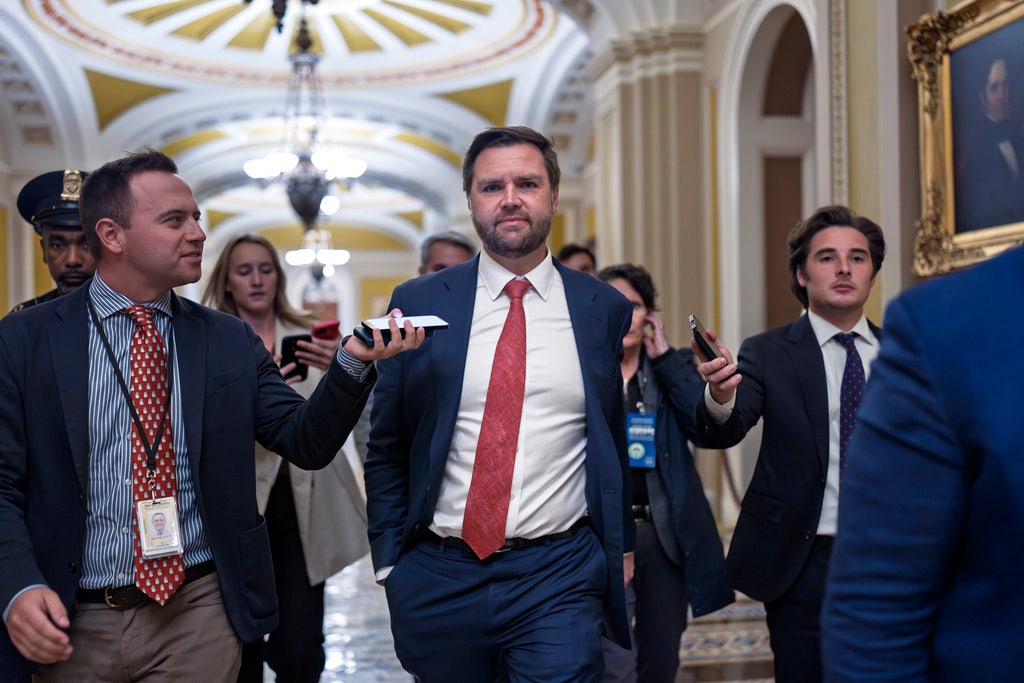Vice President JD Vance Remains Focused on Present Role While Future Possibilities Linger
In a candid conversation with Lara Trump on “My View,” Vice President JD Vance addressed speculation about his political future with measured restraint. When questioned about a potential 2028 presidential run, Vance emphasized his commitment to his current responsibilities rather than plotting his next political move. “I really think the American people are so fed up with folks who are already running for the next job, seven months into the current one,” Vance remarked, capturing a sentiment that resonates with many voters weary of career politicians. His approach reflects a deliberate focus on governance over ambition, suggesting that proven results should precede political aspirations. This perspective aligns with the personal narrative that has defined Vance’s public image—a story of overcoming significant childhood adversity and economic hardship to achieve success through perseverance.
While not closing the door on future possibilities, Vance articulated a philosophy that prioritizes performance over politics. “If we do a good job in 2025 and 2026, then we can talk about the politics in 2027,” he stated, proposing a timeline that places policy achievements ahead of campaign considerations. This methodical approach reflects Vance’s broader outlook on public service, where outcomes take precedence over opportunities. He acknowledged the competitive landscape of Republican politics, noting that “if I do end up running, it’s not going to be given to me—either on the Republican side or on the national side.” This recognition of the challenges ahead demonstrates both humility and political realism, qualities that have contributed to Vance’s appeal across different segments of the electorate. His assertion that his current role “may be the most important job I ever had, outside of being a father” further underscores his commitment to present responsibilities.
The interview offered glimpses into the working relationship between President Donald Trump and Vice President Vance, highlighting dynamics that reveal both men’s approaches to leadership. Vance described Trump’s remarkable work ethic with a mixture of admiration and amusement, noting that “the president doesn’t have an off switch” and recounting instances of receiving calls at 12:30 a.m. or 2 a.m., followed by 6 a.m. discussions on entirely different topics. These anecdotes paint a picture of an administration characterized by relentless energy and engagement. Perhaps most telling was Vance’s appreciation for Trump’s leadership style, particularly his willingness to delegate responsibility and empower those around him. “That ability to delegate and trust his people has been really amazing,” Vance remarked, suggesting a productive partnership based on mutual respect and shared objectives.
When pressed specifically about potential Democratic contenders for 2028, Vance offered only a brief assessment, observing that most “obviously have very bad records.” This cursory dismissal suggests either strategic restraint or genuine disinterest in engaging with hypothetical electoral matchups far in the future. His reluctance to elaborate on opposition figures reinforces his stated commitment to focusing on governance rather than political positioning. This approach marks a contrast with the often hyper-strategic nature of modern political communication, where officials frequently calibrate their remarks with an eye toward future electoral contests. Vance’s perspective appears to favor substantive achievement over political calculation, proposing that “if I do that, the politics will figure itself out.”
Vance’s journey from challenging circumstances to the vice presidency has become a powerful narrative in American politics, resonating with voters across demographic and ideological lines. His personal story of resilience amid family challenges and economic hardship represents a compelling embodiment of American mobility and opportunity. This background shapes not only his political identity but also his approach to governance and public service. Throughout the interview, Vance’s references to family—particularly his role as a father to “three beautiful kids”—emphasized the personal values that ground his political perspective. This integration of personal experience and political philosophy helps explain Vance’s distinctive voice in contemporary American politics, one that combines pragmatism with principle and ambition with accountability.
The conversation between Vance and Lara Trump ultimately reveals a vice president navigating the delicate balance between present responsibilities and future possibilities. Without definitively closing or opening doors to a 2028 presidential bid, Vance articulated a philosophy that places performance ahead of politics and service before self-promotion. His emphasis on hard work, measurable results, and earned advancement reflects both personal values and political strategy. As the administration moves forward, Vance’s approach suggests that his political future will be determined not by early positioning or strategic maneuvering, but by the outcomes of his current role. In an era often characterized by perpetual campaigning, this perspective offers a different model of political leadership—one focused on the substantive work of governance rather than the continuous pursuit of the next office. Whether this approach represents principled restraint or strategic patience, it distinguishes Vance in a political landscape increasingly defined by early jockeying for future positions.


